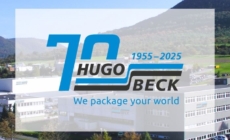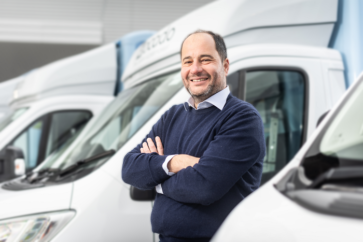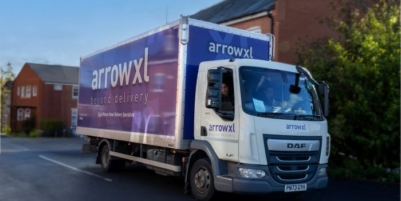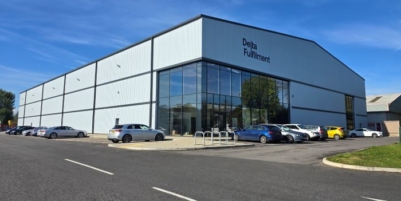-
BLACKOUT TECHNOLOGIES TARGETS TELEMATICS-INTEGRATED MOBILE DEVICE BLOCKING TO COMBAT SMARTPHONE DISTRACTION - 17 hours ago
-
OpenADR Alliance announces first OpenADR 3.0 certified products with EVoke Systems, E.ON Energy and Universal Devices - March 25, 2025
-
Growing fulfilment and contract packer appoints new Managing Director - March 25, 2025
-
When is it time to invest in a WMS? Understanding the key trigger points - March 25, 2025
-
eCapital helps Vantage Recruitment on its journey to financial success - March 24, 2025
-
Hugo Beck Celebrates 70 Years of Packaging Innovation with Open House Events - March 20, 2025
-
PROLOG FULFILMENT SUPPORTS LUNA DAILY’S COMMITMENT TO BETTER BODY CARE FOR ALL WOMEN - March 19, 2025
-
Motion Ventures launches largest-ever maritime tech fund at $100M to meet the industry’s new pace of adoption - March 18, 2025
-
ITD GLOBAL APPOINTS GROUP CHIEF REVENUE OFFICER - March 17, 2025
-
SURECAM TEAMS UP WITH ENTERPRISE FLEX-E-RENT FOR VEHICLE REPAIR & MAINTENANCE CONFERENCE - March 14, 2025
RE-100 electrification solution helps fleet managers maximise their investment in vans by extending the life of the vehicle
New solution creates a new sustainable business model for fleet operators
Ability to switch from diesel to electric ideal for ‘Last Mile’ journeys
An advanced retrofit solution which fits to existing diesel vans to make them both electric (first) and/or diesel at the touch of a button using innovative in-wheel motor (IWM) technology has been launched by BEDEO, an electric vehicle supplier and manufacturer based in Farnham.
The new RE-100 Range Extender, part of its Reborn Electric range, enables organisations with large fleets of vans, often with major conversions (e.g refrigeration units, bespoke fit outs, minibuses etc), to retain those vehicles for longer while still transitioning to an electric future.
A vehicle fitted with a RE-100 Range Extender is electric first, with 117km of electric range, making it ideal for ‘Last Mile’ deliveries. Its existing diesel mode can be used when needed for longer trips, switching to electric when entering a low-emission zone and densely populated areas to eliminate emissions and accelerate decarbonisation.
At the heart of RE-100 are two in-wheel motors and a battery designed, engineered and manufactured by BEDEO. The in-wheel motors are fitted to the rear axle of the vehicle. The motors are more compact, lighter, efficient and easier to install than an equivalent e-axle and powered by a 37kWh battery. No suspension modifications are required to the front or rear, which means there is no loss of ground clearance and no loss of load space or height.
BEDEO came to national attention in 2019 manufacturing electric vans for significant players in the ‘Last Mile delivery’ market such as OCADO, DHL and TNT. Founder Osman Boyner says that with the concept of Reborn Electric he is providing a new business model for an industry caught between the twin goals of cost and sustainability. “The traditional model of fleet owners is to invest in new vans,” he explains.
“But electric vans today don’t meet the needs of the market and even Euro VI diesel vans are still responsible for a disproportionate amount of carbon emissions. With the RE-100 we have created a new category of hybrid that not only meets the needs of the market but also accelerates transport decarbonisation.”
The RE-100 is a hybrid in as much as it can have two modes of power – electric and diesel – but with the BEDEO technology the vehicle cannot be operated as diesel within controlled low emissions zones, unless in an emergency. Outside of controlled zones the driver is in control and can determine when to stay in electric for a more pleasant driving experience, or switch to diesel for longer distances.
The ability to retrofit BEDEO’s IWM into an existing vehicle is an entirely new proposition: “BEDEO has leveraged this advanced IWM technology to develop the next generation of retrofit vehicles, unlimited by the constraints of a standard e-axle,” Osman adds.
Commercial fleet operators face a number of significant challenges in the next few years, not least the uncertainty of a moving government deadline for an all-electric future which makes the RE-100 launch even more important. Osman believes that while switching to an all-electric fleet is desirable, it is also very expensive and wasteful, requiring investment not only in the vehicles themselves, but also the infrastructure to support them.
“While sustainability is, of course, a key driver, the end-to-end sustainability (whole lifecycle) of the vehicle also needs to be taken into account,” he continues. “It cannot be sustainable to replace a vehicle that has not reached the end of its useful working life, neither is it sustainable to replace not only the vehicle, but also the refrigeration units or bespoke fit-out that many of these vehicles have.
“Retrofitting with electric overcomes these challenges and more, satisfying the need to reduce emissions in our city centres where the majority of the ‘Last Mile’ journeys are required, breathing new life into older vehicles.”
Today BEDEO can fit Reborn Electric solutions to a wide range of large commercial vans including the Peugeot Boxer, Citroen Jumper, the Fiat Ducato and Vauxhall Movano, with the intention to be a solution provider for all large vans. BEDEO has the capacity to convert hundreds of vehicles at any one time at its sites in Europe.
Reborn Electric is a range of retrofit solutions that includes the RE-100 range extended option and the BE-100, BE-250 and BE-350 full electric options.

































